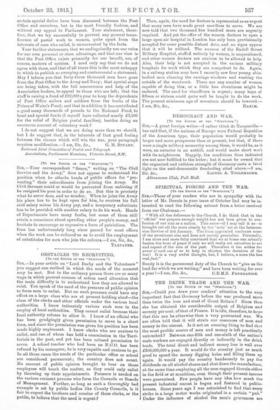OBSTACLES TO RECRUITING, f To THE EDITOR OF THE "
SPECTATOR."1 SIR,—In your article on "Lord Derby and the Volunteers" you suggest one method in which the needs of the moment may be met. But to the ordinary person there are so many ways in which present courses of action need alteration that the main difficulty is to understand how they are allowed to exist. You speak of the need of the pressure of public opinion to force men to enlist. But no such pressure could have any effect on a large class who are at present holding aloof—the class of the clerks and other officials under the various local authorities. I know intimately various such men in the employ of local authorities. They cannot enlist because their local authority refuses to allow it. I know of an official who has been grudgingly given permission to serve in a short time, and since the permission was given his position has been made highly unpleasant. I know clerks who are anxious to enlist, and one of whom has held a commission in the Terri- torials in the past, and yet has been refused permission to serve. A school teacher who had been an N.C.O. has been refused by his managers; he is very capable and anxious to go. In all these oases the needs of the particular office or school are considered paramount; the country does not count. No amount of public opinion brought to bear on these employees will touch the matter, as they could only enlist by throwing up their appointments. Pressure is needed on the various eminent persons who form the Councils or Boards of Management. Further, so long as such a thoroughly bad example is set by public bodies like County Councils, is it fair to expect the brothers and cousins of these clerks, or the publics, to believe that the need is urgent P Then, again, the need for doctors is represented as so urgent that many men have made great sacrifices to serve. We are now told that two thousand five hundred more are urgently required. And. yet the offer of the women doctors to open a large open-air hospital in London has only been provisionally accepted for some possible distant date, and no signs appear that it will be utilized. The success of the Endell Street Military Hospital, staffed entirely by women, is unquestioned, and other women doctors are anxious to be allowed to help. Also, their help is not accepted in the various military hospitals for work which they are competent to do. Again, in a railway station near here I recently saw four young able- bodied men cleaning the carriage windows and washing the outside of the woodwork. There are any number of women capable of doing this; or a little less cleanliness might be endured. The need for chauffeurs is urgent; many boys of fifteen or sixteen could quite well be taught to do the work. The present minimum age of seventeen should be lowered.—






































 Previous page
Previous page